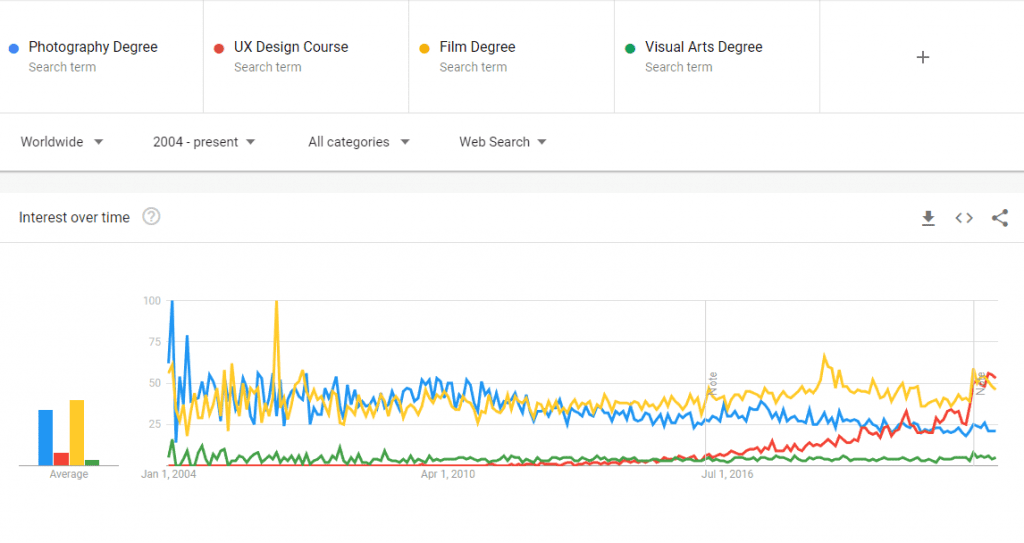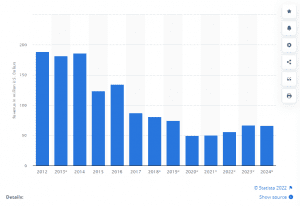In a decade where the pandemic accelerated innovation and technology, highly marketed 3-year Photography courses are becoming money traps that only cater to the wealthy and privileged. If you wanna make money consider taking a different course and forget about that pesky degree in photography.
Thinking of getting that photography degree? STOP and consider what I’m going to tell you. Unless you’re hopeless and filthy rich, feel free to do whatever you want. But I don’t need to share the many horror stories of individuals and their student loans, affecting these people physically and mentally, years after matriculation. This study sheds light on the negative effects of student debt. Apart from this is the shift to a highly digital environment—print media is either dying or dead—people are consuming more video content. This is why Instagram’s algorithm prioritizes reels over images. So it’s quite surprising to see certain educational institutions still marketing Photography Degrees. When investing on education or offering it, doesn’t it makes more sense to choose a program that addresses the current and future needs of the market?
Photography is in steady decline
The simple Google Trends search below shows you the steady decline of Photography Degree as an interest. It’s obvious that the Tiktok generation had significant influence over this. In 2016, you’ll see how Film and Photography interests significantly diverge, with Film taking the lead. We can surmise that—since video content is the more valuable format—people would tend to position themselves to earn a Film Degree. While a photography degree is nice, a degree in Film or video production already considers photography as a prerequisite. With the looks of it, a degree in Film is more advantageous and valuable, as it addresses the need for video content production in most if not all industries that demand it. Netflix, Amazon Prime Video, Paramount+, and HBO Go are already competing giants in the video streaming platform industry. The keyword is VIDEO. We haven’t even scratched the surface of Twitch and Youtube. That leaves photography/print media in the dust.

For a more bang-for-buck investment, I would suggest that the creatively inclined focus on more flexible or agile programs and courses like UX and UI design, or Multimedia arts (Note: DLS-CSB has the best MMA program amongst top design schools offering this course in the Philippines). The fact that I and other Multimedia Arts Graduates were able to pursue a career in photography, is already telling of how minuscule the impact of Photography degrees and programs are in making competitive and successful photographers post-college. A well-versed student of the internet can literally learn photography from loads of content, sometimes uploaded by famous photography professionals themselves. Free on Youtube, paid on Udemy or Coursera. You get my point. There’s no need to spend money or incur debt for a degree that can’t compete in terms of innovation and demand.

You don’t need a degree to be a photographer. But maybe you need to be Jewish?
Alfred Stieglitz and Irving Penn are some of the most widely recognized photographers of the 20th century. Stieglitz didn’t have a photography degree, Penn on the other hand had a diverse visual arts education—and goddamn, he’s the most celebrated of the bunch. I was quite fortunate to have visited his Centennial at the Metropolitan Museum.
They were masters of the camera, a fairly complicated device for the common folk who didn’t have access to such contraptions and chemicals—since most of the 20th century was still based on analog photography that required an understanding of chemistry. While you can still learn traditional film photography, you don’t have the same barriers anymore when it comes to digital. Most of the photography art and history can be found on the internet. Even the technical aspects are easy to find on Youtube. But there are a few things that will set you apart from your typical facebook group photographer.
What Photographers or Creatives should Focus on:
- Learning WYSIWYG website design for your portfolio
- Digital marketing to market and retarget customers and visitors
- Improving business acumen and financial literacy
- Creating a valuable and diverse network of mentors, experts, and customers. You can start by avoiding the Canon 2021 Ambassadors except for Jilson Tiu—Jilson dropped his sponsorship.

Basically, you should be looking for a mentor. A good one with a good track record. Working on the job is the best experience. Sure an education helps, but again, you don’t need a photography degree to learn from the best. I know a few, feel free to ask via my contact page or the comments below.
What should you do then? Be Valuable.
For the value of a 3-year course, take a 3-day workshop instead. Photography isn’t as complex as people would make it. With the vast array and availability of online learning portals, racking up on online certificates from Coursera and getting Linkedin Certified profiles is instantly more valuable than a three-year photography course. Remember that photography is just one skill. With more marketable skills comes more value. It’s better to be a generalist nowadays than a specialist. While there is certainly a place for specialists, generalists make up a larger chunk of many successful organizations. Globe Business (Globe Telecom) for example, restructures certain business units inside their organization every year or so. When looking at the profile of the employees, you’d be surprised that most if not all lean toward a generalist profile. These people are more valued because of their various skill sets. And for those who really think that technical knowledge is so important–the best fine art photographers don’t muddle their process with technical know-how and jargon. These artists educate themselves in topics BEYOND photography. For the camera is merely a tool for expression!




